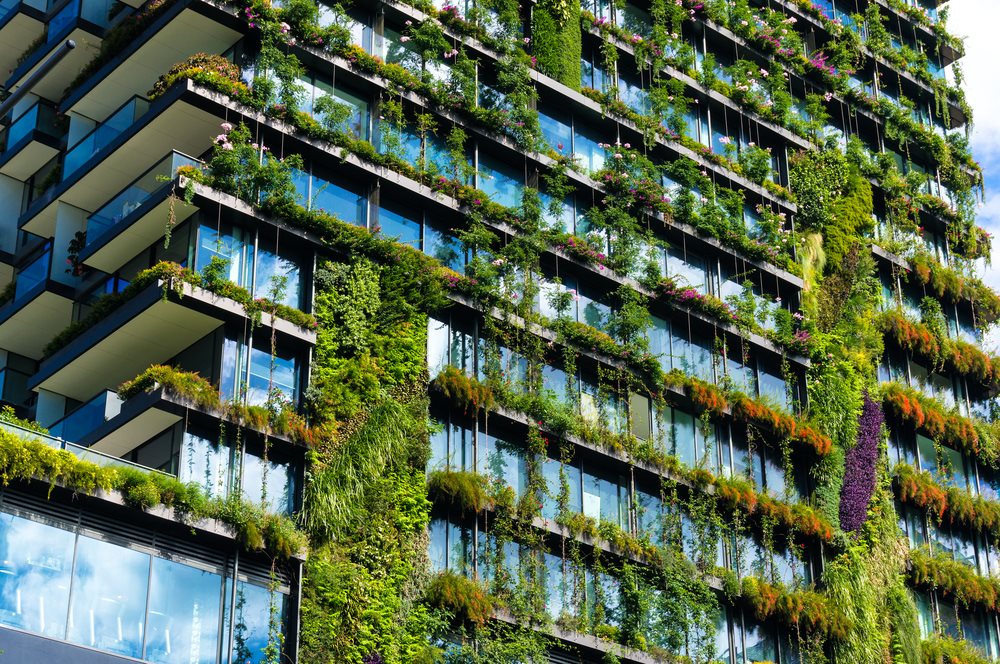

Insights Building a career for a sustainable future
The Global Construction 2030 report reveals that over the next decade construction output will expand by 85%. Though millions of housing units need to be built around the world to accommodate the growing population, such an expansion is a threat to our environments and the species that inhabit them. Professionals are now dedicating their careers to delivering smarter construction solutions and sustainability has rightfully made its way onto the agenda for many governing bodies.
Freya Crunden, an environmental consultant at AtkinsRéalis , encouragingly remarks that there is no single way into a career in sustainability because sustainability covers a breadth of areas, from carbon emissions and biodiversity to community and finance. This means that for anyone looking to taking their passion for the environment and turn it into a career, there are many options. Let's take a look at some of the most exciting jobs in this realm and how you can build a career for a sustainable future.
Why sustainability is important to us
Sustainability is about creating a world that we're all happy to live in and proud to pass onto the next generation, knowing that we've built a better future for them. It’s a bold claim to say that a career in sustainability is a chance to save the world but it’s one that we stand by. At Atkins, we’re proud to be supporting people who are committed to finding a career where they can help to cut carbon emissions, preserve biodiversity and reduce our overall impact on the environment.
A sustainable career in infrastructure
The Upcycle – a book written by an architect and chemist to make a case for a better-designed world – states that “Human beings don't have a pollution problem; they have a design problem.”Urbanisation and population growth have drained our natural resources, not because the rate we’ve used them at but the way we’ve used them.
When bringing a green building to life, architects will work alongside civil and mechanical engineers, urban planners and building surveyors. They’re responsible for designing energy, waste and waters systems that have the lowest impact on the surrounding landscape. As costs for building materials and concern for our impact on the environment both mount in equal measures, green architects with innovative and cost-effective solutions will be more highly sought after.
Buildings not only need to be constructed from eco-friendly materials, but they must also incorporate energy-saving techniques. There’s a growing trend within architecture and surveying to use smart city technologies to help design these sustainable buildings. The use of these technologies has allowed architects to push the boundaries of design and shift their focus to other areas, such as biophilic design. Biophilia is based on the understanding that humans enjoy better health and wellbeing when they are closer to nature. As a result, we see buildings like the Nanjing Vertical Forest which not only connect people in large cities with the outdoors, but this particular building can reduce CO2 emissions by around 18 tons each year.
A sustainable career in engineering
Not long ago, sustainability was the latest trend within construction but a few years on and sustainable construction has become mainstream and more niche sustainability trends are emerging. Sustainability within civil engineering was first understood to be incorporating “green” elements in a design but the concept has transformed and is now accepted as the foundation of any building or structure.
According to the British Assessment Bureau, sustainable construction is: using renewable resources, reducing energy consumption, creating a healthy environment, and protecting the natural environment. Because the construction sector is accountable for 36% of the world’s energy consumption, civil engineers have the important job of pulling all these factors together and using them to design a holistic approach.
Today's engineers are extremely privileged because they have access to some cutting-edge technology, including AI tools which take the menial tasks off their hands and leave them with more time to tackle the complex issues within sustainability. Additionally, they have use of Building information modelling (BIM) technology which is used to survey a site before building begins and creates 3D visualisations of the design. BIM is celebrated for advancing sustainability by helping to reduce the amount of energy and materials consumed over a project lifecycle and therefore allowing those projects to be delivered at a lower financial and environmental cost. With technology now playing a central role in the daily life of an engineer, hiring managers are seeking candidates who have experience in data analysis and even coding in some cases.

Equality, diversity & inclusion
Promoting equality, diversity and inclusion
A sustainable career in transportation
Transportation can't only be about making travel more efficient and cutting down on fuel emissions. While these are both important factors for sustainable project managers to consider, for it to tick all the sustainability checkboxes it needs to introduce and enhance wildlife habitats. When environmental laws regarding air pollution and noise pollution started getting stricter, the transportation sector saw sustainable practices as a challenge. Since companies have recognised how important it is to construct roads, railway systems, bridges, tunnels and ports that both minimise disturbances and support the surrounding ecosystem, the view has shifted from a challenge to an opportunity.
This is just how we viewed it when we began our joint venture to upgrade a key section of the A14 which passed through the flatlands of Cambridge. Our environmental consultants helped to deliver a design that created high corridors and tunnels for wildlife, a new network of lakes for protected species and realigned a river so that it worked with, and not against, the water course.
Build a sustainable career with AtkinsRéalis
If you’re searching for a rewarding career, then look no further than sustainability. At AtkinsRéalis , we have a strong portfolio of brands - including Atkins, Faithful+Gould and Acuity – and a network of 50,000 professionals in over 50 countries. Our world-class expertise means that a job with us is an opportunity to make a real difference and work on some of the most exciting sustainability projects. View our cities and development jobs or browse the latest project, programme and cost management jobs.
Interested? Find out more about life at AtkinsRéalis
Sign up to receive the latest content tailored to your interests
Our articles
+(1).jpg)
Preview
AustraliaContent type
BlogsPublish date
04/24/2024
Summary
In a momentous shift, SNC-Lavalin has transitioned to AtkinsRéalis, marking a new era of innovation, collaboration, and excellence in engineering consultancy. With this rebrand comes a fresh persp
.jpg)
Preview
IndiaContent type
BlogsPublish date
04/23/2024
Summary
As Mumbai continues to evolve and expand, the demand for sustainable infrastructure and cutting-edge technology has never been more pressing. At the forefront of this transformative journey is Atk

Preview
EuropeContent type
BlogsPublish date
04/22/2024
Summary
Hi there! I'm Paul, a civil engineer with over 25 years of experience specializing in networks and drainage engineering. My role at AtkinsRéalis spans managing projects, directing major initia

by
Shailaja Mantha

Preview
EuropeContent type
BlogsPublish date
04/22/2024
Summary
Meet Paul, a talented civil engineer in water management whose career journey is as inspiring as impressive. Starting at AtkinsRéalis, fresh out of university in 1997, Paul quickly distinguish

by
Shailaja Mantha

Preview
Middle EastContent type
BlogsPublish date
04/18/2024
Summary
In the vast expanse of the Saudi Arabian landscape, you’ll find a beacon of innovation, a vision for a better, greener tomorrow. NEOM sits in the heart of the Tabuk province and isn’t just anothe

Preview
AsiaContent type
BlogsPublish date
04/18/2024
Summary
As a global metropolis, Hong Kong has long been a fantastic place to be a civil engineer. With world-class infrastructure all around, effective civil engineers have many opportunities to be a
.jpg)
Preview
AustraliaContent type
BlogsPublish date
04/18/2024
Summary
In January 2024, Srijana embarked on a new chapter in her engineering career, joining AtkinsRealis as a Chartered Structural Engineer. With six years of experience on a wide variety of projects, Sr

Preview
Middle EastContent type
BlogsPublish date
04/16/2024
Summary
In the Kingdom of Saudi Arabia (KSA), you’ll find an awe-inspiring and profoundly transformative endeavor that encapsulates innovation, sustainability, and the unparalleled proficiency of AtkinsRéa

Preview
EuropeContent type
BlogsPublish date
04/11/2024
Summary
Hello, I'm Ben, Mechanical Team Lead in the Decommissioning & Waste Services team. My journey at AtkinsRéalis, from a graduate to a team lead, has been inspired by my belief that we can "engin

by
Shailaja Mantha
.jpg)
Preview
EuropeContent type
BlogsPublish date
04/04/2024
Summary
Welcome to the dynamic world of nuclear engineering – where innovation meets sustainability. We unveil the pathway to landing a nuclear engineering job, even without prior experience in the nuclea

Preview
Middle EastContent type
ProjectsPublish date
04/04/2024
Summary
The AtkinsRéalis team, in a commendable collaboration with the site team, United Engineering Construction (UNEC), and its subcontractors, has exhibited exceptional dedication and expertise, making

Preview
Middle EastContent type
BlogsPublish date
04/04/2024
Summary
In the world of construction and development, where innovation meets hard work under the towering silhouettes of our projects, the role of women has been historically underrepresented. However, the

AtkinsRéalis
Equality, diversity and inclusion
We’re devoted to growing the diversity of our people, promoting an inclusive culture, providing everyone with an equal voice because simply put, it’s the right thing to do. Click to learn more.
Find out more



